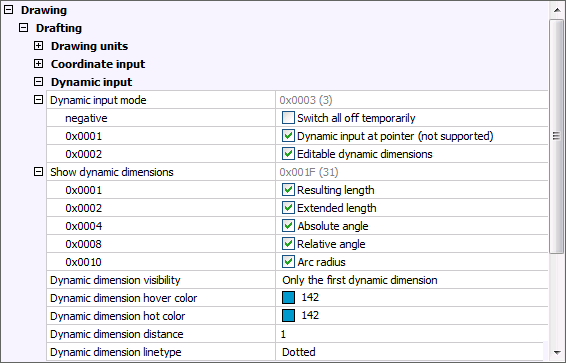
Dynamic dimensions provide an interface at the cursor position to specify the length and angle of the linear entity being created or grip-edited. As such dynamic dimensions help you to focus on the drawing area.
The behavior and appearance of dynamic dimensions is controlled through a series of system variables and user preferences.
Defining the Dynamic Dimensions Settings
Right click the DYNMODE field in the Status Bar, then choose Settings in the context menu.
The Dynamic input settings in the Settings dialog display:

Define the DYNMODE
system variable, to switch the display of dynamic dimensions and/or
dynamic input on/off.
Please notice that dynamic input at the pointer is not implemented
yet.
Define the DYNDIGRIP system variable, to select the dynamic dimension types to be displayed.
Resulting length: total length of the line or polyline segment
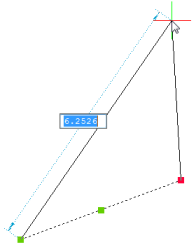
Extended length: incremental length of the line
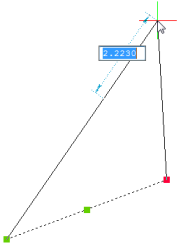
Absolute angle: angle relative to the X-axis of the current UCS
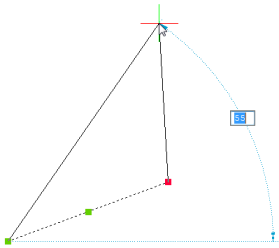
Relative angle: angle relative to the original angle of the linear entity
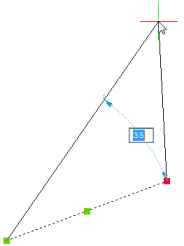
Arc radius: radius of arcs and circles
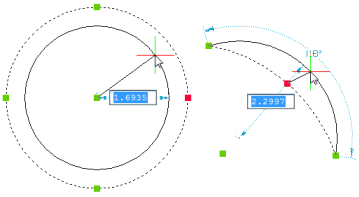
Define the DYNDIVIS system variable to choose the number of dynamic dimensions that display simultaneously.
Only the first dynamic dimension (DYNDIVIS=0): hit the TAB key to display and edit the next dynamic dimension, as defined by the DYNDIGRIP system variable.
Only the first two dynamic dimension (DYNDIVIS=1): hit the TAB key to edit the next dynamic dimension, as defined by the DYNDIGRIP system variable and display the next plus one.
All dynamic dimensions as defined by DYNDIGRIP (DYNDIVIS=2): hit the TAB key to edit the next dynamic dimension
Set the dynamic dimensions user preferences to define the appearance (color, linetype and position) of dynamic dimensions.
Using dynamic dimensions when creating entities
Launch the command to create a 2D entity (e.g. Line and DYNDIVIS = 1 or 2).
Specify the first point, then move the cursor to
display the dynamic dimensions.
The Length dynamic dimension
highlights.
Do one of the following:
Type the desired length of the line, then hit
the TAB key to jump to the Angle
dynamic dimension.
The Length dynamic dimension is
locked and displays in red and the Angle dynamic dimension is selected.
Type the desired length of the line, then click to create the line at the angle defined by the cursor position.
Hit he TAB key to jump to the Angle dynamic dimension.
If DYNDIVIS = 0, the Length dynamic dimension disappears when you hit the TAB key.
Do one of the following:
Type the desired angle, then hit the Enter key to create the line.
Type the desired angle, then hit the TAB key to return to the Length dynamic dimension.
Hit the Enter key to create the line at the angle defined by the cursor position.
Hit the TAB key to return to the Length dynamic dimension.
If DYNDIVIS = 0, the Arc dynamic dimension disappears when you hit the TAB key.
|
NOTE |
If ORTHO is on, you can still specify the angle using the Angle dynamic dimension. |
Using dynamic dimensions to grip-edit entities
Select the entity or entities.
All grips on the selected entities display.
Click the grip you want to edit, then move the
cursor.
Depending on the value of the DYNDIVIS system variable one, two or
all dynamic dimensions display dynamically.
The first dynamic dimension highlights.
Do one of the following:
Type the desired value for the currently
highlighted dynamic dimension, then hit the TAB key to jump to the
next dynamic dimension.
The dynamic dimension is locked and displays in red.
Type the desired value for the currently highlighted dynamic dimension, then press Enter to stop.
Hit the TAB key to jump to the next dynamic dimension.
Repeat step 3 or press Enter to stop.
Using dynamic dimensions to measure entities
Select the entity or entities.
All grips on the selected entities display.
Hover the cursor over a grip.
The grip highlights and all dimensions related to the selected grip
display.
|
|
|
|
Dynamic dimensions used to measure a rectangle (left) and a line (right). |
|
(option) Click to start editing the selected grip.
| © Menhirs NV. All rights reserved. |